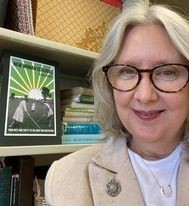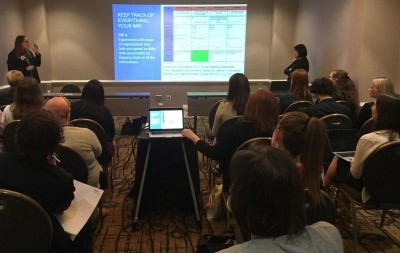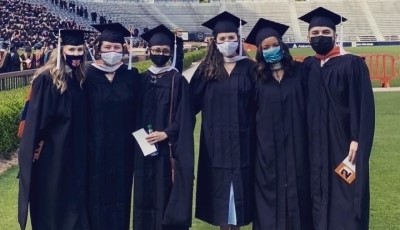The literature faculty in the Department of English welcomes you to our MA and PhD program. Find out more about our award-winning faculty and our exciting literature graduate program below.
Application Deadline: January 15
- transcripts for all prior degrees.
- a personal, professional statement that includes your academic background, relevant experiences, and short- and long-term goals.
- a writing sample in the form of an academic, analytical essay from English studies or a closely related field or of a publication. For the MA, 10-15 pages; for the PhD, no more than 25 pages.
- a curriculum vitae.
- 3 confidential letters of recommendation.
GRE General Test scores are not required at this time. Please check our website for the most up-to-date information regarding test scores.
If you are interested in receiving a graduate teaching assistantship (GTA) or other financial support for your first year, you must complete and submit your application by January 15.
Our graduate students study and work with a nationally and internationally recognized graduate faculty. Recent book commendations include:
- Juliane Braun received The Theatre Library Association’s George Freedley Memorial Award for Exemplary Work in Live Theatre or Performance for Creole Drama: Theatre and Society in Antebellum New Orleans.
 Alicia Carroll’s New Woman Ecologies: From Arts and Crafts to the Great War and Beyond is one of the fifteen books chosen for Yale University Climate Connections to honor women leading the way on climate change.
Alicia Carroll’s New Woman Ecologies: From Arts and Crafts to the Great War and Beyond is one of the fifteen books chosen for Yale University Climate Connections to honor women leading the way on climate change.- Ernest L. Gibson III’s Salvific Manhood: James Baldwin's Novelization of Male Intimacy was selected as a 2020 Choice Outstanding Academic Title by the American Library Association.
With these faculty and others, graduate students can take complementary courses outside the department to develop specializations or minors in subjects such as sustainability, diversity, women’s and gender studies, and communication. A minor requires two courses (a total of six credits) chosen from courses in English or another discipline relevant to the student's professional and academic goals.
Students and faculty work collaboratively on a variety of departmental and university-wide endeavors and committees. Graduate students serve on all major departmental committees, such as the Graduate Studies and Composition Committees.
Literature graduate students work with faculty who can mentor and help students make connections in academia. Among the journals for which faculty are advisory editors and editorial board members are Nineteenth-Century Gender Studies, American Periodicals: A Journal of History, Criticism, and Bibliography, SEL (Studies in English Literature), Journal of American Drama and Dance, The Harold Pinter Review, Explorations in Renaissance Culture, The Scriblerian, and The Comparatist.
Our faculty also hold distinguished positions both in and outside Auburn University. Ernest Gibson is the Director of Africana Studies, our interdisciplinary program for the study of historical and contemporary developments that combine to define the social, cultural, aesthetic, political, and economic realities of the people of African descent. Sunny Stalter-Pace was recently appointed to be the Chair of Interdisciplinary Approaches for the Modernist Studies Association Board. Emily Friedman, who has recently won an “Innovative Course Design” award from the American Society for Eighteenth-Century Studies, is the Associate Director of 18thConnect.org, a curated digital aggregator and peer-reviewing body for projects in eighteenth-century studies. She works with a team of graduate students and one of them is the project manager.
With application by the January 15 deadline and admission as a full-time student, students are offered a graduate teaching assistantship (GTA). It not only provides a stipend, subsidized insurance, travel money for research and conferences, and tuition remission but also offers valuable teaching experience. PhD students teach both composition and literature courses. All first-year MA students participate in a practicum on teaching college-level literature and composition courses and receive guidance as beginning teachers. They also work closely with a faculty member as discussion leaders in core literature courses. In their second year, they are the instructors of record for composition classes. Many of our students also work as program or research assistants in the department or a few hours a week in the Miller Writing Center and in library positions in Reference or the Special Collections Department.
Currently one of our PhD students holds a 3-year Presidential Graduate Research Fellowship, and another was awarded the College of Liberal Arts Outstanding GTA Teaching Award. They are frequent winners of the Merriweather and the “Best Graduate Student” fellowships given by the Dean of the Graduate School. Each year graduate students can win awards and honors from our department, including the Hammersmith Awards for Best Papers written in seminars by MA and PhD students, the Yates and Ward Allen Awards, and the GTA Teaching Award. Once PhDs have entered the dissertation stage of their degree, they are eligible for Semester and Summer Dissertation Fellowships. Graduate students are also able to win awards and scholarships from the university as a whole.
 With some department travel support, our students have attended conferences such as the International Congress on Medieval Studies, Modern Language Association of America, Society for Comparative Literature and the Arts, National Women’s Studies Association, International Social Theory Consortium, and Black Studies and Romanticism Virtual Conference.
With some department travel support, our students have attended conferences such as the International Congress on Medieval Studies, Modern Language Association of America, Society for Comparative Literature and the Arts, National Women’s Studies Association, International Social Theory Consortium, and Black Studies and Romanticism Virtual Conference.
As a literature graduate student in the Department of English, you will gain skills inside and outside the classroom that employers both in and outside of academia desire.
- analytical and organizational skills
- written and oral communication skills
- awareness of research methods
- ability to implement research skills
- awareness of values and diversity
Auburn is an R1 institution, a designation by the Carnegie Classifications indicating that we are a doctoral university with very high levels of research activity. The plethora of publications that come from our faculty and graduate students illustrate this. Recent literature students’ publications have been in in journals such as Women’s Studies: An Interdisciplinary Journal, Eighteenth-Century Studies, Feminist Modernist Studies, Journal of American Drama and Theatre, James Baldwin Review, Textual Practice, Victorian Poetry, Oxford Literary Review, and American Studies and in well-reviewed collections including Approaches to Teaching the Works of Flannery O’Connor (MLA), The Spiritualist Movement (Praeger), and The Routledge Handbook of Crime Fiction and Ecology.
 Our students are supported by Auburn University Libraries, which include five locations across our main campus, and is a member of the Association of Research Libraries (ARL). The ARL is an institutional membership organization made up of only 125 elite libraries and archives at major public and private universities, federal government agencies, and large public institutions in Canada and the United States. As an ARL we help advocate for research libraries, advance research and learning missions with our fellow research and higher education partners, share intelligence on current issues, and, partly with graduate students working in the library, help develop the next generation of diverse library leaders.
Our students are supported by Auburn University Libraries, which include five locations across our main campus, and is a member of the Association of Research Libraries (ARL). The ARL is an institutional membership organization made up of only 125 elite libraries and archives at major public and private universities, federal government agencies, and large public institutions in Canada and the United States. As an ARL we help advocate for research libraries, advance research and learning missions with our fellow research and higher education partners, share intelligence on current issues, and, partly with graduate students working in the library, help develop the next generation of diverse library leaders.
They have published in Textual Practice, Victorian Poetry; Feminist Modernist Studies; Journal of American Drama and Theatre; Journal of Modern Literature; American Studies, English Literature in Transition, 1880-1920; The Oxford Literature Review; Eighteenth-Century Fiction; Tulsa Studies in Women’s Literature, and Women’s Studies: An Interdisciplinary Journal, among many others.
Graduate students are encouraged to become members of EGA, Auburn’s English Graduate Association. EGA hosts a variety of professional development events throughout the year, as well as social events. It cannot be understated how important a support system is for all graduate students, and EGA creates an environment where all graduate students work to support each other. EGA also hosts SELARC (Southeastern Liberal Arts Research Conference) each year. SELARC is an opportunity for Auburn graduate students to not only present amongst their peers from other universities, but also gain experience in organizing and planning a small-scale conference.
Many of our MA graduates enter PhD programs at universities all over the country. Among them are Vanderbilt; UCLA; Notre Dame; UNC, Chapel Hill; University of Minnesota; Purdue; Northeastern, and here at Auburn. Others begin a wide variety of careers including communications, media support, and teaching.
 Our PhD graduates have teaching positions at Boston University; University of North Georgia; University of Alabama, Huntsville; Albany State University; Kennesaw State University; Columbus State University, and Auburn University Montgomery. A 1999 graduate is now Provost at Coastal Carolina University. Our graduates have also achieved success in positions such as Director of National and International Fellowships and Scholarships at the University of Alabama, Birmingham; Writer-Editor for National Security Science at the Los Alamos National Laboratory; and Educational Content Specialist at the American Eagle Foundation.
Our PhD graduates have teaching positions at Boston University; University of North Georgia; University of Alabama, Huntsville; Albany State University; Kennesaw State University; Columbus State University, and Auburn University Montgomery. A 1999 graduate is now Provost at Coastal Carolina University. Our graduates have also achieved success in positions such as Director of National and International Fellowships and Scholarships at the University of Alabama, Birmingham; Writer-Editor for National Security Science at the Los Alamos National Laboratory; and Educational Content Specialist at the American Eagle Foundation.
With application by the January 15 deadline and admission as a full-time student, students are offered a graduate teaching assistantship (GTA). It not only provides a stipend, subsidized insurance, travel money for research and conferences, and tuition remission but also offers valuable teaching experience. PhD students teach both composition and literature courses. All first-year MA students participate in a practicum on teaching college-level literature and composition courses and receive guidance as beginning teachers. They also work closely with a faculty member as discussion leaders in core literature courses. In their second year, they are the instructors of record for composition classes. Many of our students also work as program or research assistants in the department or a few hours a week in the Miller Writing Center and in library positions in Reference or the Special Collections Department.
Currently one of our PhD students holds a 3-year Presidential Graduate Research Fellowship, and another was awarded the College of Liberal Arts Outstanding GTA Teaching Award. They are frequent winners of the Merriweather and the “Best Graduate Student” fellowships given by the Dean of the Graduate School. Each year graduate students can win awards and honors from our department, including the Hammersmith Awards for Best Papers written in seminars by MA and PhD students, the Yates and Ward Allen Awards, and the GTA Teaching Award. Once PhDs have entered the dissertation stage of their degree, they are eligible for Semester and Summer Dissertation Fellowships. Graduate students are also able to win awards and scholarships from the university as a whole.
 With some department travel support, our students have attended conferences such as the International Congress on Medieval Studies, Modern Language Association of America, Society for Comparative Literature and the Arts, National Women’s Studies Association, International Social Theory Consortium, and Black Studies and Romanticism Virtual Conference.
With some department travel support, our students have attended conferences such as the International Congress on Medieval Studies, Modern Language Association of America, Society for Comparative Literature and the Arts, National Women’s Studies Association, International Social Theory Consortium, and Black Studies and Romanticism Virtual Conference.
